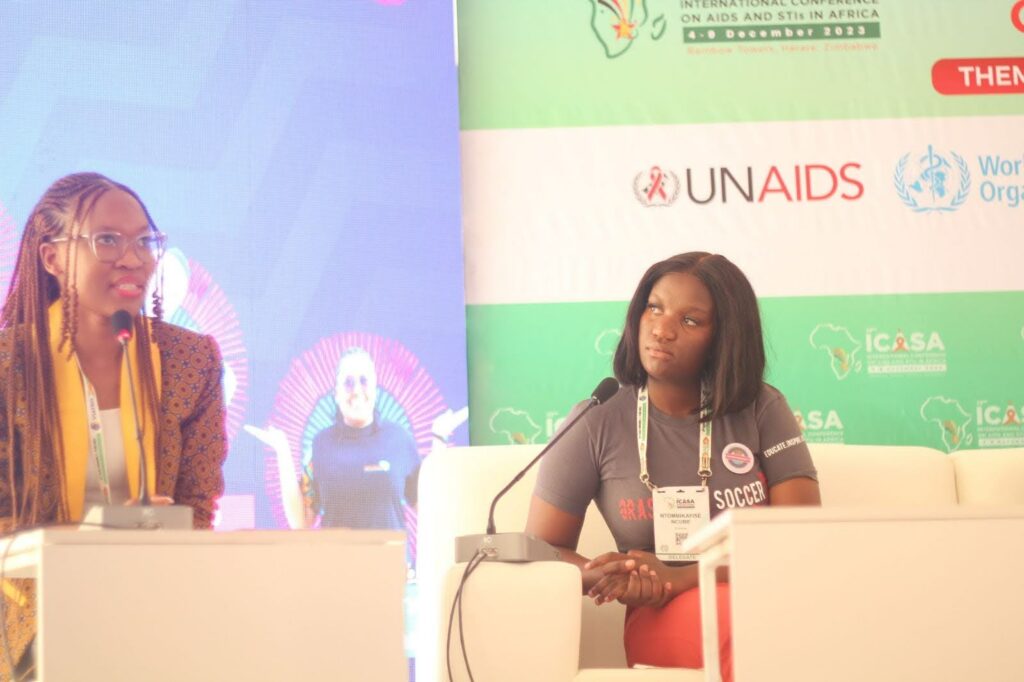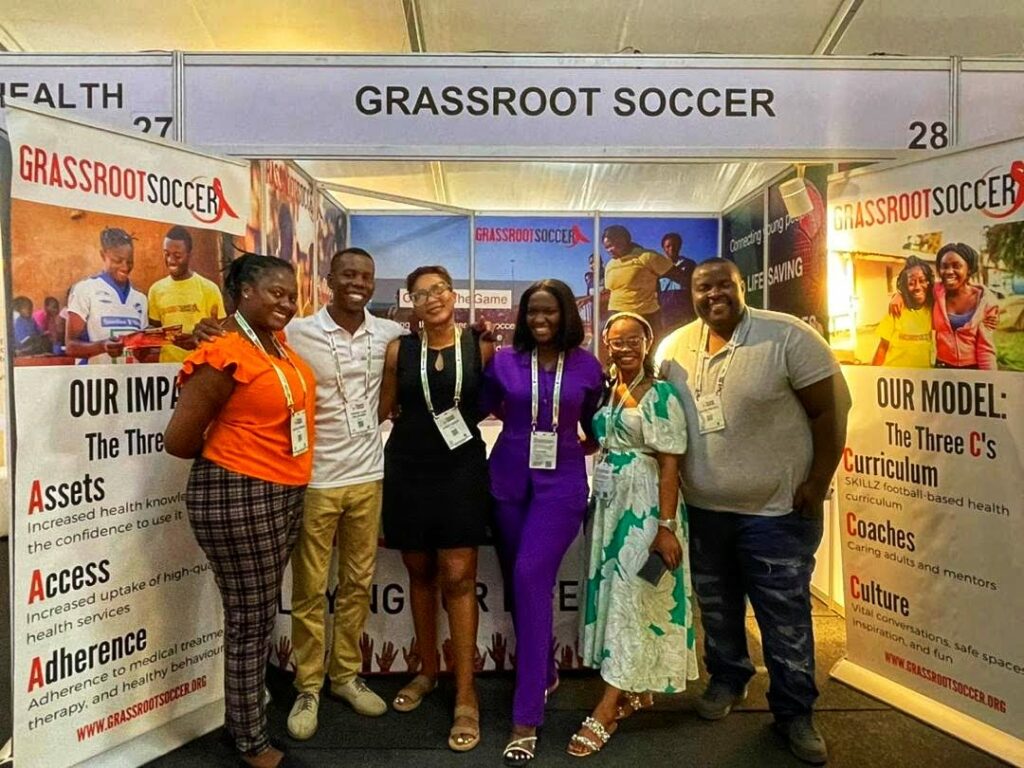In December 2023, a delegation of Grassroot Soccer (GRS) team members attended the 22nd International Conference on AIDS and STIs in Africa (ICASA) in Harare, Zimbabwe. At the conference, the GRS team connected with peers, shared insights and learnings, and joined critical conversations on successes and challenges in effectively addressing HIV/AIDS and STIs across Africa.
One of those critical conversations was a youth-led panel on how youth networks can accelerate the HIV response and strengthen the sexual and reproductive health and rights (SRHR) of young people. Representing GRS on the panel was SKILLZ Coach and Trainer Ntombikayise Ncube.
Based in Bulawayo, Zimbabwe, Ntombikayise joined GRS as a SKILLZ Coach in 2021 and recently completed her Bachelor of Science Honours in Psychology degree. GRS’s Praise Dlakama caught up with Ntombikayise after the conference.
Praise: What was your experience attending ICASA as a young person?
Ntombikayise: Many times as young people, we usually follow conferences online, but being able to physically attend and connect with other youth from all over the world was amazing. In the Youth-Led Change session, I felt I was able to fully represent young people in Zimbabwe with confidence, alongside my fellow panelists from Lesotho, Democratic Republic of Congo, Tanzania, and South Africa.
Being a youth advocate, I spoke about my experiences with GRS as a community change maker and how, through our SKILLZ program activities, I mentor other young people to become agents of change in their communities. I spoke about the unmet needs of adolescents regarding their sexual and reproductive health, as well as the potential for digitalization to enhance youth’s access to health services. Speaking on the panel made me proud of the work that I do at GRS.
What were some other ways that youth voice was prominent at the conference, and what did you take away from these conversations?

Ntombikayise: I attended sessions that were mostly youth-focused. The youth pre-conference was great. The meeting was convened by young people, featured youth as moderators and panelists, and addressed key issues that affect young people.
Discussions at the youth pre-conference covered harmful laws and practices that continuously create barriers to accessing SRHR services and limit the HIV response for youth. For example, stigmatization and discrimination in health facilities against young people living with HIV results in poor health-seeking behaviors, and young people in rural areas lack life-saving information on SRHR, creating a massive knowledge gap that limits their ability to access relevant services. Additionally, young people with disabilities face challenges such as self-stigma, stereotypes, community stigma, language barriers, and limitations in accessing SRH services.
From discussing all these topics, my greatest takeaway is that young people play a pivotal role in being agents of change. They are ready to lead and champion the effort to end AIDS by 2030. We have the power, and what has to be done is ensuring that young people are united towards this common goal. This requires continuous support and platforms to mentor them to become assertive leaders and youth advocates, just like what we do at GRS in our SKILLZ programs.
You also staffed a GRS exhibition stand at the conference and got to meet many individuals that way. What interactions stood out to you?
Ntombikayise: I knew soccer was a popular sport in Zimbabwe, but after the conference, I fully realized that it is a powerful tool to reach out to young people anywhere. Our stand was quite unique and many delegates, from all corners of the globe, were drawn to it by soccer. They wanted to understand our methodology and learn about how we use the sport to empower young people with life-saving information and skills.
I also was so delighted to meet a number of former GRS Coaches and participants at the conference! They shared with me their testimonials of how the life-saving information in the SKILLZ programs helped them to make informed decisions and safe, healthy choices in their life. It is so powerful to hear young people share things like, “Here I am, I’m pursuing my degree,” or “I graduated last year,” and attribute those achievements to the information they got from the SKILLZ program. Adolescence is a critical phase in life, and it made me appreciate the great work that GRS does in transforming the lives of young people.
There were several sessions on digital innovations at the conference. What do you think about the ways that digital technologies can transform adolescent health?
Ntombikayise: We are now living in the 21st century and young people prefer things that are digitized; that they can easily access from their mobile phones. At the conference, I learned about an app where adolescents can ask questions and book appointments for mental health counselling, and another through which users can get online counselling services and access critical information on HIV and mental health.
These innovations are very important to reach out to young people in our digital era. At GRS, we have been working on reaching young people with SKILLZ content through digital channels.
[In 2023, GRS reached more than 1 million adolescents with our fun, phone-based Digital SKILLZ game on sexual and reproductive health. The game, which has been translated into seven languages and is reaching kids in Liberia, Malawi, Mozambique, and Nigeria, uses interactive voice response (IVR) technology to guide participants on a learning journey about critical topics like healthy relationships, family planning, and gender equality. The game is youth-friendly, high-energy, and interactive – listen to a clip here.]
Now that you are back in Bulawayo and have had time to digest your experience at ICASA, where to from here?
Ntombikayise: I’ve talked with other youth advocates, and going beyond ICASA, I feel I have the responsibility to share what I learned with other young people, especially at GRS. I am sharing learnings on how we can get engaged as young people to speak out and to push some of the issues that adolescents were advocating for at the conference, including issues around choice when it comes to HIV prevention methods, medication, and the latest information on SRH.
I feel that I’ve been empowered by the conference, and it’s my duty to relay the information that I learned to my peers and continue to be a community change maker in my work with GRS.

